All cat owners have been the victim of a foot ambush. We all know the routine—you sit down to rest or get into bed and your cat pounces at your feet for no apparent reason. The moment you move your toes; they attack those, too.
So why do cats attack feet? Cats are known for exhibiting some strange and inexplicable behaviors, but there are several intriguing reasons as to why cats love feet so much.
Why Do Cats Like To Bite Our Feet?
Cats instinctively want to pounce on moving objects, including your feet.
There’s one big reason why cats bite and attack your feet and ankles when you walk, and that’s down to their natural instincts. Chasing is an innate behavior for cats, and as predators, it’s second nature for them to pounce on a moving object or a moving human!
Also Read: Why Does My Cat Attack My Feet?
Natural Instincts
Biting at perceived “prey” is normal for cats, but it’s important to discourage this behavior so you don’t get hurt.
Domestic cats still have strong hunting instincts, and a human foot is similar in shape and size to their usual prey. If you’re wearing fluffy slippers or socks that look like a small mammal, this could make it even more encouraging for your cat!
If your cat bites your feet, don’t take it too personally, it’s just their hunting behavior taking over, and your feet have become the prey. This behavior might be more common in young cats that are exploring their instincts and are more playful, or indoor cats that don’t have the opportunity to hunt.
You might have noticed some stalking behaviors before your cat pounces on your feet, and sometimes, the bites and scratches can be more painful or even draw blood. If your cat bites and breaks your skin, it’s important to wash the area thoroughly and contact a medical professional as cats have lots of bacteria in their mouth that can cause infections.
Also Read: Cat Love Bites: 5 Reasons Why They Do It & How To Respond
Play
It’s especially vital to prevent your cat from pouncing on the feet of babies or toddlers who have delicate skin.
Cats are curious and playful, and as your feet are so accessible, they make for an irresistible toy. When cat owners ask, “Why does my cat bite my feet and ankles when I walk?” play is the most common reason why.
Your feet are a moving object, and as you move farther away from your cat it makes them more playful and they can’t resist engaging further in what they think has become a game. Cats typically mouth very gently when they are playing in this way—it’s like a love bite and sign of affection.
Another common question is “Why does my cat bite my feet under the blanket?” This is because another great game involves feet is at bedtime. When your feet move around under the blanket it adds another layer to the game and captures your cat’s intrigue.
They can see something moving under the blankets, so they might attack from the top or crawl under and nibble your toes. Your feet are protected, so you’re less likely to get hurt by this game, although it can be annoying when you’re trying to sleep.
Also Read: Why Do Cats Knead and Bite Blankets?
When Is Foot Biting a Problem?
Biting at feet can easily cross over from harmless play to painful injury.
It’s sometimes cute and playful when a cat attacks your feet, but other times this behavior can become problematic. If your cat is regularly attacking your feet, it’s time to investigate.
Boredom and Attention Seeking
Boredom can lead a cat to take drastic measures to entertain themself and get your attention.
If your cat is bored and doesn’t get enough stimulation or exercise, they can turn to you to burn off some energy or release frustration. In these instances, the bites or scratches might be more intentional or break the skin.
This can be your cat’s way of getting your attention. Perhaps they’ve been left home alone too long or don’t have enough to do, but they might simply dislike you paying close attention to something else.
Also Read: The 5 Best Interactive Cat Toys for Bored Cats
Overstimulation Aggression
When cats become overstimulated, they sometimes react with aggressive behavior.
There is such a thing as too much attention, and if your cat is overstimulated, they can become a little overzealous with aggressive play. Your feet are often the nearest thing for them to pounce on. Biting and scratching is a cat’s way of letting you know that they’ve had enough, but it can also be a sign that they’ve become overstimulated and taken the game too far.
Other signs of aggression include:
- Tail twitching or swishing
- Ears down
- Dilated pupils
- Skin twitching
- Body tensing
- Growling or hissing
- Turning the head
Aggression is often caused by other underlying problems. Common reasons are:
- Pain: If your cat is feeling pain, it might be more defensive or on edge, and aggression can be the cat’s way of letting you know. Pain could be caused by arthritis, soft tissue injuries, abdominal pain, or dental disease.
- Stress: Changes in a cat’s environment can lead to signs of aggression, and overstimulation can cause stress.
If your cat is showing new signs of aggression, it’s important to get them checked by a veterinarian for an examination. The vet might need to run some tests to rule out medical issues. Once treated, medical issues can be managed, and aggression often resolves. You can also discuss behavior problems with a veterinary behaviorist for further professional advice.
Also Read: How To Deal With Food Aggression In Cats
How To Stop Foot Biting
One of the best ways to correct unwanted behavior is redirecting your cat to a more suitable activity.
If your cat’s foot biting is a problem or becoming aggressive, or if it’s simply very annoying, there are several easy ways to correct it. Cats need time and patience to correct unwanted behaviors, and you’ll need plenty of treats and rewards on hand.
Ignore Them
To show your cat that you don’t like this game, stand still, turn your back to them, and slowly walk away.
If you stop reacting when your cat bites your feet, they will soon learn to stop. This is how kittens learn how to behave from one another—if they do something to their littermates and the sibling doesn’t like it, they’ll move away, and the kitten will learn that biting means the end of the game.
So if you stand still, or calmly move yourself away from your cat without looking at them or reacting, they will have time to calm down and understand that this isn’t an appropriate game to play.
Also Read: Why Does My Cat Ignore Me?
Redirection and Avoidance
If it looks like your cat is about to attack your feet, toss a toy away from your body to redirect your cat.
Once you’ve moved yourself away from your cat and they’ve quietened down, you can redirect them to another more suitable toy. Throwing a ball for them or playing with another toy they can chase will redirect their attention away from you.
You can then use treats to reward this play. If your cat looks up for a game, get their toys out and play with those so that you completely avoid them choosing your feet as the toy. You should always make sure your cat has access to plenty of toys and scratching posts to prevent boredom and provide them with mental and physical stimulation.
Also Read: The 10 Best Cat Slow Feeders & Puzzle Feeders
Positive Reinforcement
Rather than yelling at your cat, redirect them with a toy, then reward them with a treat for playing with it.
You must never use negative punishments when your cat bites your feet. Stern words, shouting, or pushing them away won’t teach them not to do it again. Cats struggle to associate the negative punishment with their behavior. Instead, they associate it with you doing something negative to them. This can be damaging to your bond with your pet and can make them fearful of you and avoid coming to you for affection.
Using positive reinforcement is far more effective. Reward your cat with a treat for playing with their toys, and they will learn that this is the right way to play.
Also Read: 8 Reasons You Should Never Punish Your Cat
Address the Underlying Cause
If you suspect your cat is suffering from pain or stress, work with your veterinarian to find a solution.
If your cat’s aggression is a result of pain or stress, make sure to address this. Treat any medical conditions following your vet’s advice and identify stressors in their environment. You can use synthetic cat pheromones such as Feliway to create a calming environment, and ensure your cat has plenty of safe and comfortable places to rest or hide.
Also Read: The 7 Best Calming Cat Treats
Cats biting our feet can be playful, but it can also be problematic. Usually, it’s because the movement of our feet on ground level mimics their prey, and their natural instincts to chase and catch them kick in.
But if this turns into aggression then you should seek advice from your vet and look into the various ways of correcting the behavior. It’s important to understand your cat’s body language and how their minds work, and you should only use positive reinforcement and distractions.
Also Read: Why Does My Cat Bite Me When I Pet Her?
Frequently Asked Questions
How do I get my cat to stop biting my feet?
You can prevent your cat from biting your feet using positive reinforcement of good behaviors, providing them with a distraction, or ignoring them.
Why is my cat obsessed with my feet?
Cats like feet because they move, and because they are the same size and shape as their usual prey. So their natural hunting instincts kick in when they see our feet move.
Why does my cat grab my leg and bite me?
Cats can bite our feet and legs playfully, but it can also be aggressive. Aggression can be caused by overstimulation, pain, stress, and boredom.
Why does my cat attack my feet when I walk away?
This might be your cat’s way of asking for more attention from you if they are unhappy that you are moving away from them.
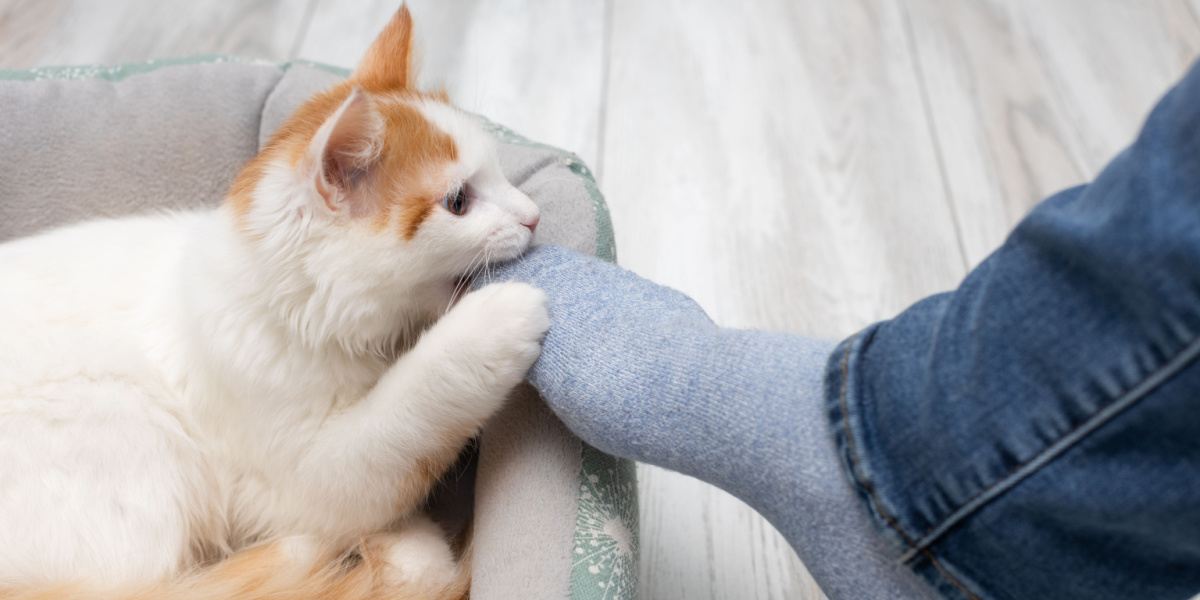
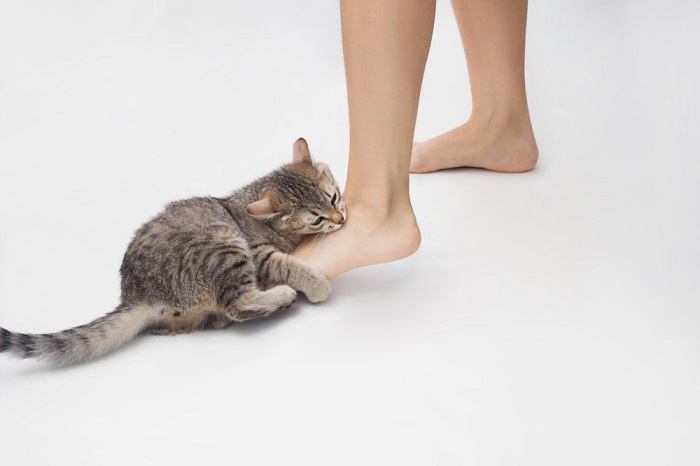
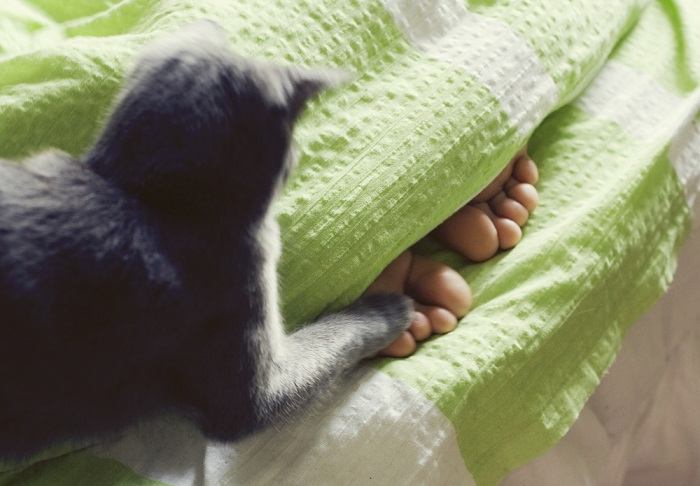
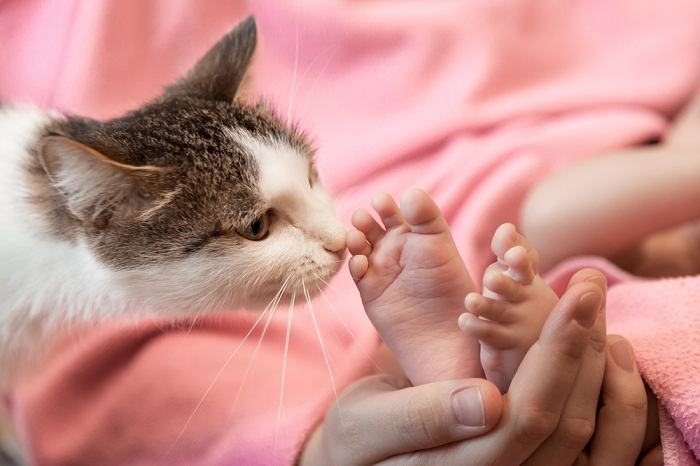
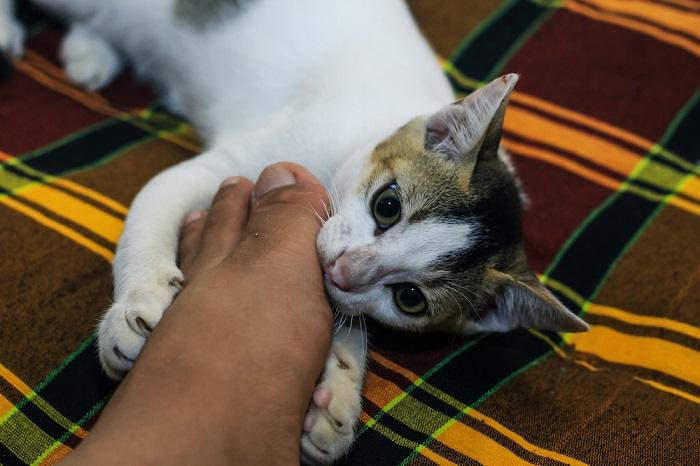
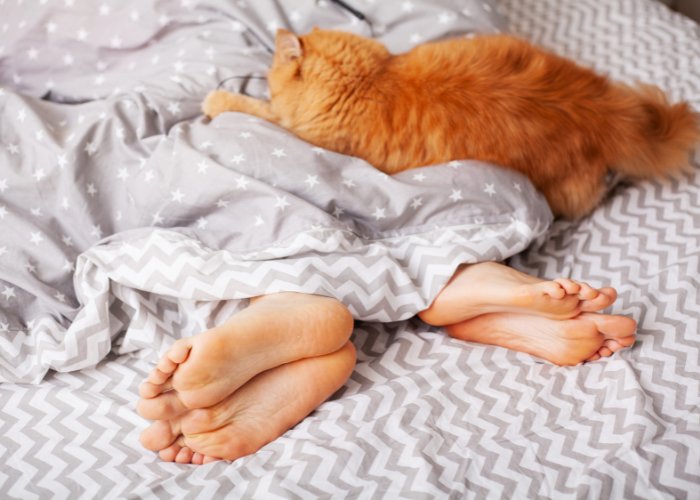

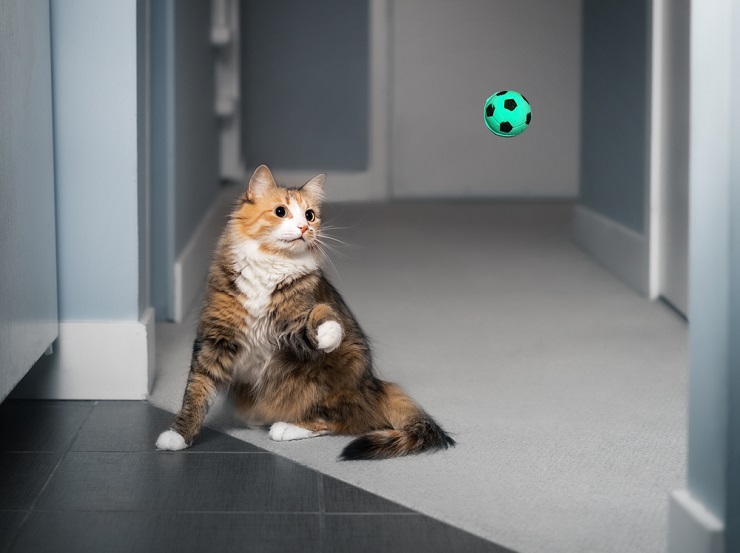
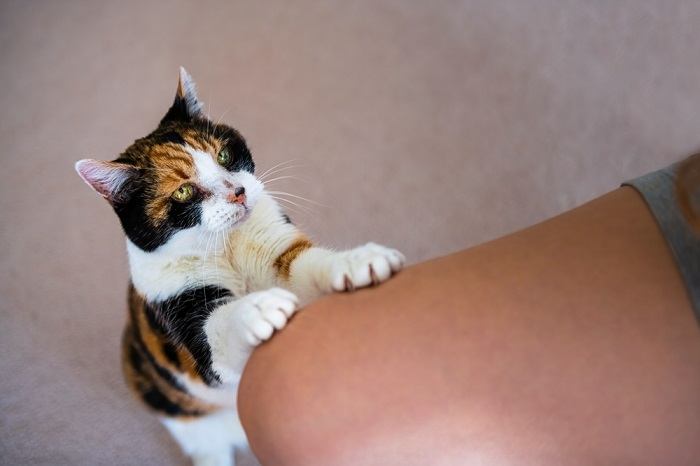
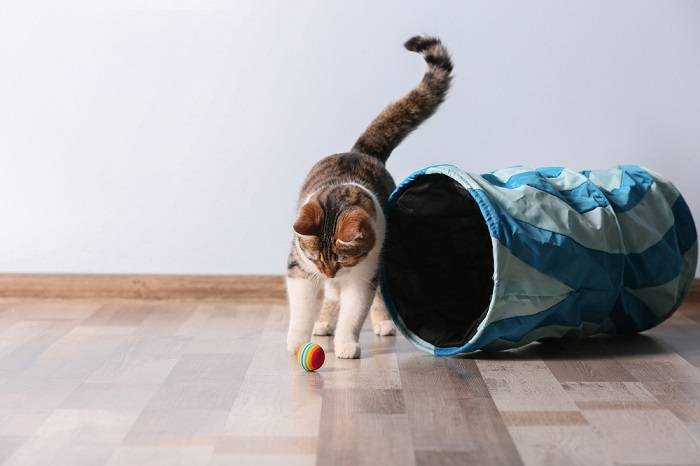
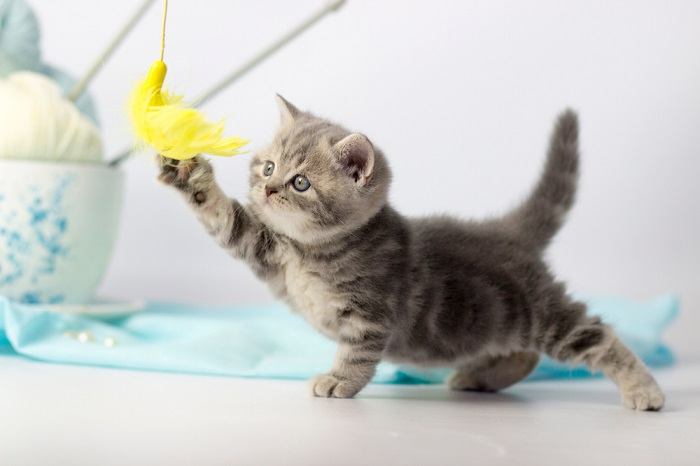
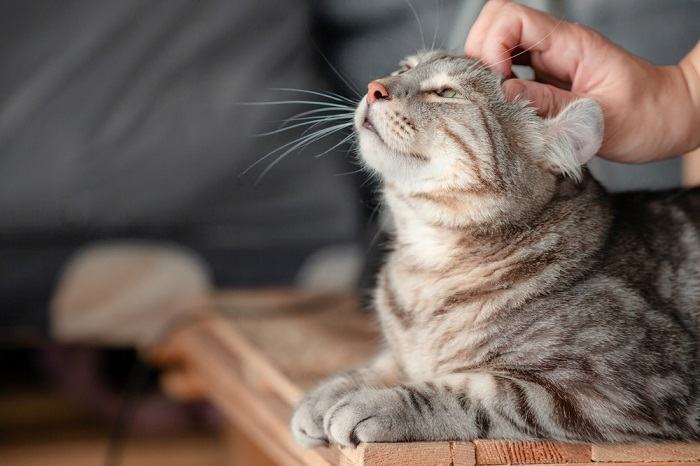

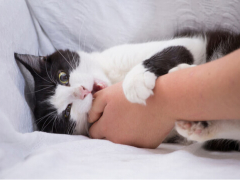




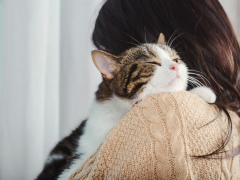

I rescued an adult female cat that wasn’t being adopted because she bites hands and feet for seemingly no reason. (I didn’t know that when I got her!) She was my first cat but I didn’t want to give her up knowing she is extremely unlikely to be adopted. The first few months, my legs were constantly shredded up bloody! I tried following the “do not react to her bites” suggestions, but it’s really hard when the pain is so intense it makes you scream. The only thing that ended up working was something not on any website, I hissed at her to make her stop biting me. Now she’s just a quirky weird girl that sometimes likes chewing on my feet and hands. She’s still bites but she doesn’t bite hard enough to draw blood anymore. 🙂 I like to say she likes saying Hi with her teeth. She’s scared a lot of my family unfortunately and gave my brother a fear of cats!
(She’s 3 years old and has no medical issues, she got a thorough exam by 2 different vets. Her love of biting is really just because of play, and being a weird cat.)
Thanks for sharing your experience! We use the hiss around here, too.